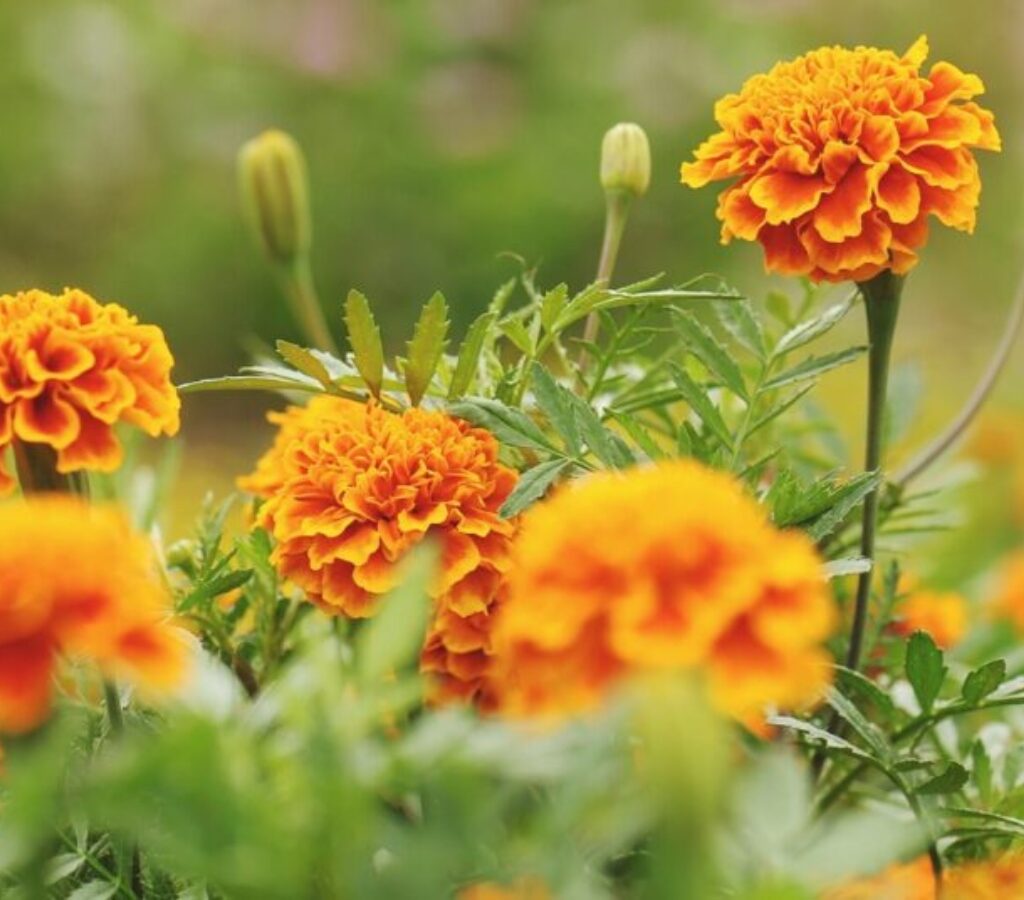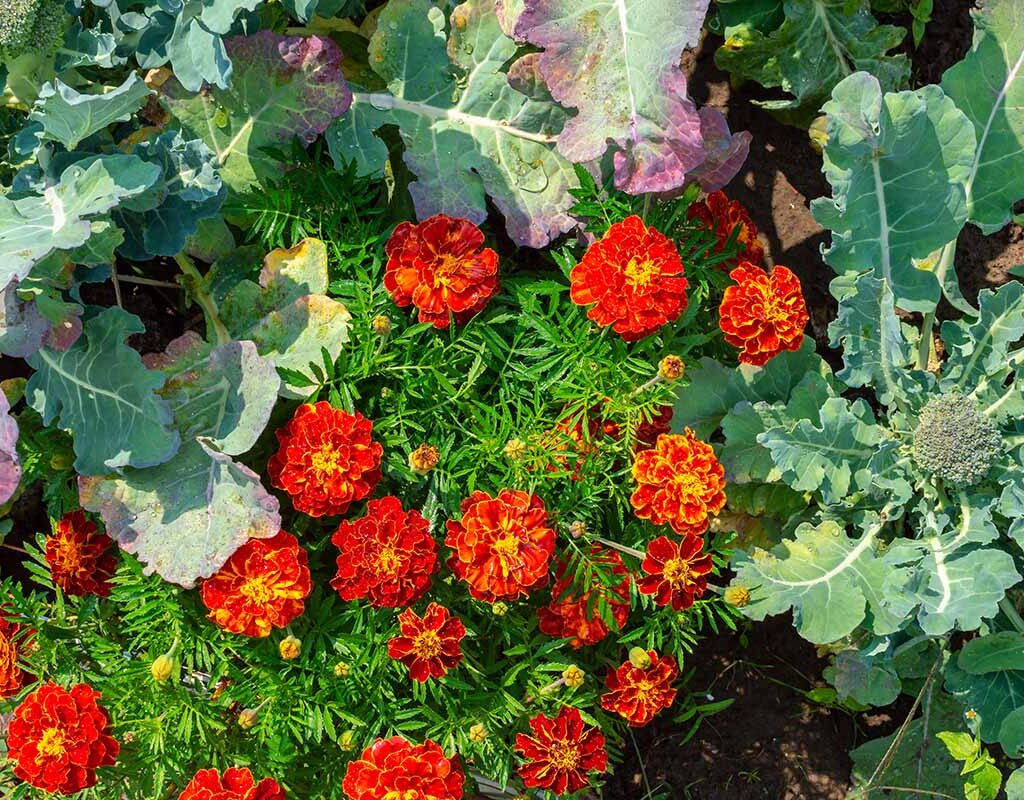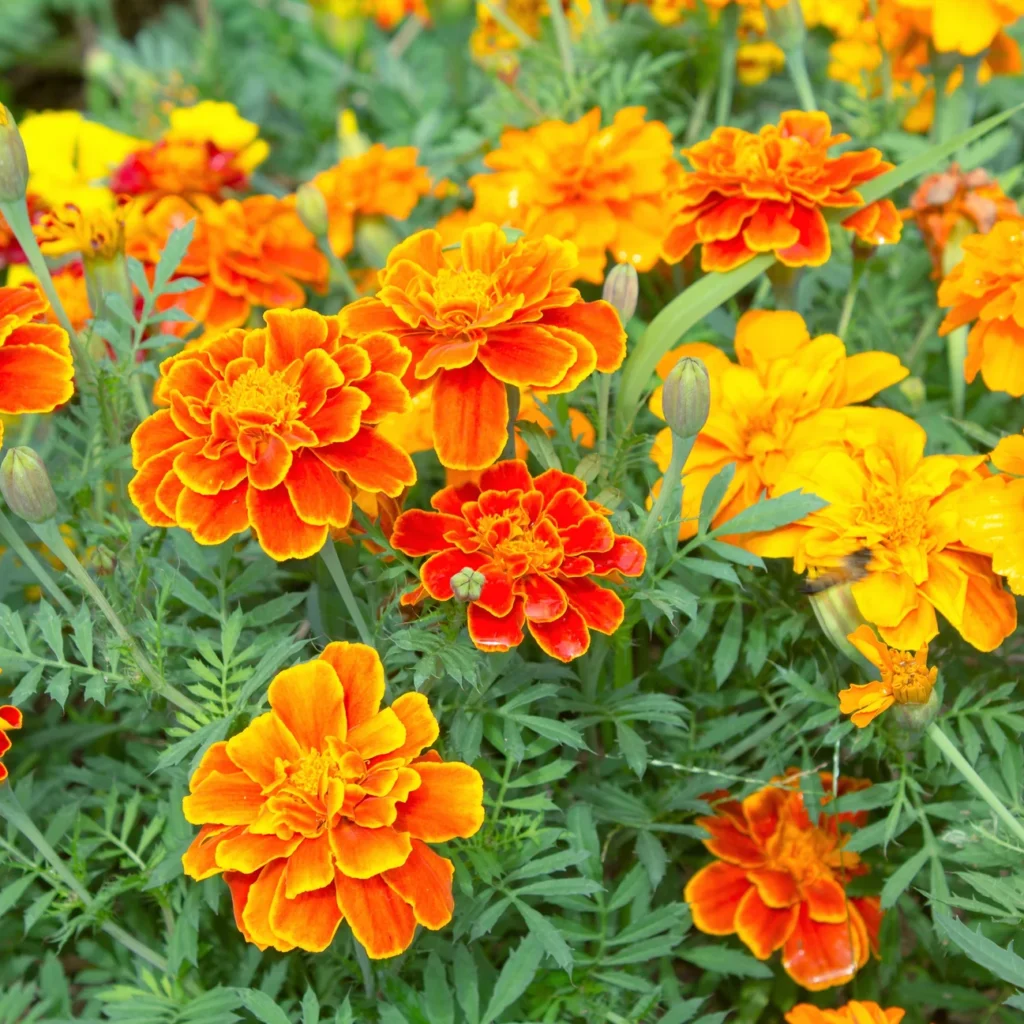Marigolds are among the most popular and easy-to-grow annual flowers, known for their vibrant golden, yellow, and orange blooms. But beyond their decorative value, marigolds have long been cherished by gardeners for their remarkable companion planting benefits, particularly in vegetable gardens.
Whether you’re growing tomatoes, peppers, cucumbers, or leafy greens, adding marigolds to your vegetable patch can improve plant health, increase yields, and naturally deter pests. In this article, we’ll explore in detail why you should add marigolds to your vegetable garden, the specific benefits they offer, and how to grow and care for them successfully.
What Are Marigolds?

Before diving into their benefits, it’s important to understand what marigolds are and the types most commonly used in vegetable gardens.
Common Types of Marigolds:
- French Marigolds (Tagetes patula): Compact, bushy, and ideal for borders.
- African Marigolds (Tagetes erecta): Taller plants with large, bold blooms.
- Signet Marigolds (Tagetes tenuifolia): Delicate foliage and small, edible flowers.
Native to Central and South America, marigolds thrive in a variety of conditions, making them a versatile and beneficial addition to any edible garden.
Natural Pest Control
One of the most valuable reasons to plant marigolds in your vegetable garden is their natural pest-repellent properties.
Which Pests Do Marigolds Repel?
- Aphids
- Whiteflies
- Mosquitoes
- Cabbage worms
- Tomato hornworms
- Squash bugs
- Nematodes (soil-borne pests)
The distinct scent of marigolds acts as a natural deterrent for many common vegetable garden pests, reducing the need for synthetic pesticides and promoting a balanced garden ecosystem.
Pro Tip:
Interplant marigolds among your vegetables or create a perimeter border to shield your crops from pest invasions.
Nematode Control in Soil

One of the most unique benefits of marigolds is their ability to reduce harmful soil-borne nematodes — microscopic worms that attack plant roots, stunting growth and reducing yields.
How Marigolds Control Nematodes:
Certain marigold species, particularly French marigolds, release natural compounds from their roots, such as alpha-terthienyl, which are toxic to harmful nematodes.
Pro Tip:
Plant marigolds as a cover crop before your vegetable season or rotate them into your beds every couple of years to cleanse the soil.
Attract Beneficial Insects

Marigolds not only repel harmful pests but also attract beneficial pollinators and predator insects that support healthy vegetable growth.
Beneficial Insects Drawn to Marigolds:
- Ladybugs: Aphid predators
- Hoverflies: Pollinators and aphid control agents
- Parasitic wasps: Target caterpillars and other pests
- Bees and butterflies: Essential pollinators
Pro Tip:
Plant marigolds near flowering vegetables like squash, melons, and tomatoes to boost pollination rates and fruit production.
Enhance Vegetable Garden Beauty

While their practical benefits are undeniable, marigolds also bring color, charm, and visual interest to your vegetable garden.
- Their cheerful blooms brighten up garden rows and beds.
- They create an aesthetically pleasing contrast with green vegetable foliage.
- Marigolds can be used as low borders or filler plants in open spaces.
Pro Tip:
Use marigolds to frame raised beds or line pathways, adding structure and color to your garden layout.
Improve Soil Health
Marigolds contribute to overall soil health and biodiversity through their root systems and natural compounds.
Benefits to Soil:
- Suppress harmful nematodes and other soil-borne pathogens.
- Increase organic matter when plants are turned under as green manure.
- Foster a diverse soil microbiome that benefits vegetable root systems.
Pro Tip:
After the growing season, till marigold plants into the soil to enrich it with organic matter and nutrients.
Quick-Growing and Low Maintenance

Marigolds are one of the easiest flowers to grow, making them ideal for busy vegetable gardeners.
Marigold Growing Facts:
- Germinate quickly in 5–7 days.
- Thrive in full sun and well-drained soil.
- Require minimal care, needing only occasional watering and deadheading.
- Resistant to drought and common plant diseases.
Pro Tip:
Sow marigold seeds directly into vegetable beds or start transplants indoors 4–6 weeks before your last frost.
Edible and Medicinal Uses
Some marigold varieties, especially signet marigolds, produce edible flowers with a citrusy, slightly peppery flavor.
How to Use Edible Marigolds:
- Add petals to salads for color and flavor.
- Garnish soups and desserts.
- Brew calming herbal teas.
Marigold petals also possess anti-inflammatory and antiseptic properties and have been used in traditional herbal remedies for skin care and minor wounds.
Pro Tip:
Only consume organically grown marigolds, as store-bought ornamental varieties may be treated with chemicals.
Excellent for Companion Planting
Marigolds excel in companion planting schemes, benefiting neighboring vegetables through natural pest control and improved pollination.
Best Companion Plants for Marigolds:
- Tomatoes
- Peppers
- Eggplants
- Cucumbers
- Squash
- Beans
- Melons
- Leafy greens
Pro Tip:
Avoid planting marigolds with legumes like peas and beans in some cases, as marigolds may hinder nitrogen-fixing bacteria in their root systems.
How to Grow and Care for Marigolds in a Vegetable Garden
Planting:
- Choose a sunny spot with at least 6 hours of direct sunlight daily.
- Space French marigolds 6–9 inches apart, and African marigolds 12–18 inches apart.
- Sow seeds directly after the last frost or start indoors for early blooms.
Watering:
- Water newly planted marigolds regularly.
- Once established, marigolds are drought-tolerant and need minimal watering.
Maintenance:
- Deadhead spent flowers to encourage continuous blooms.
- Remove yellowing leaves or plants with disease signs.
Pro Tip:
Mulch around marigolds to conserve moisture and suppress weeds.
Conclusion
Adding marigolds to your vegetable garden is one of the simplest, most effective ways to promote plant health, deter pests, and beautify your growing space. These cheerful blooms offer natural pest control, nematode suppression, and pollinator attraction, while improving soil health and adding a burst of color among your vegetable rows.
By selecting the right marigold varieties, integrating them into strategic companion planting schemes, and practicing simple care routines, you’ll enjoy a more vibrant, productive, and sustainable vegetable garden season after season.
Whether you’re a new gardener or a seasoned grower, there’s every reason to include marigolds in your edible garden — a small flower with big benefits.





